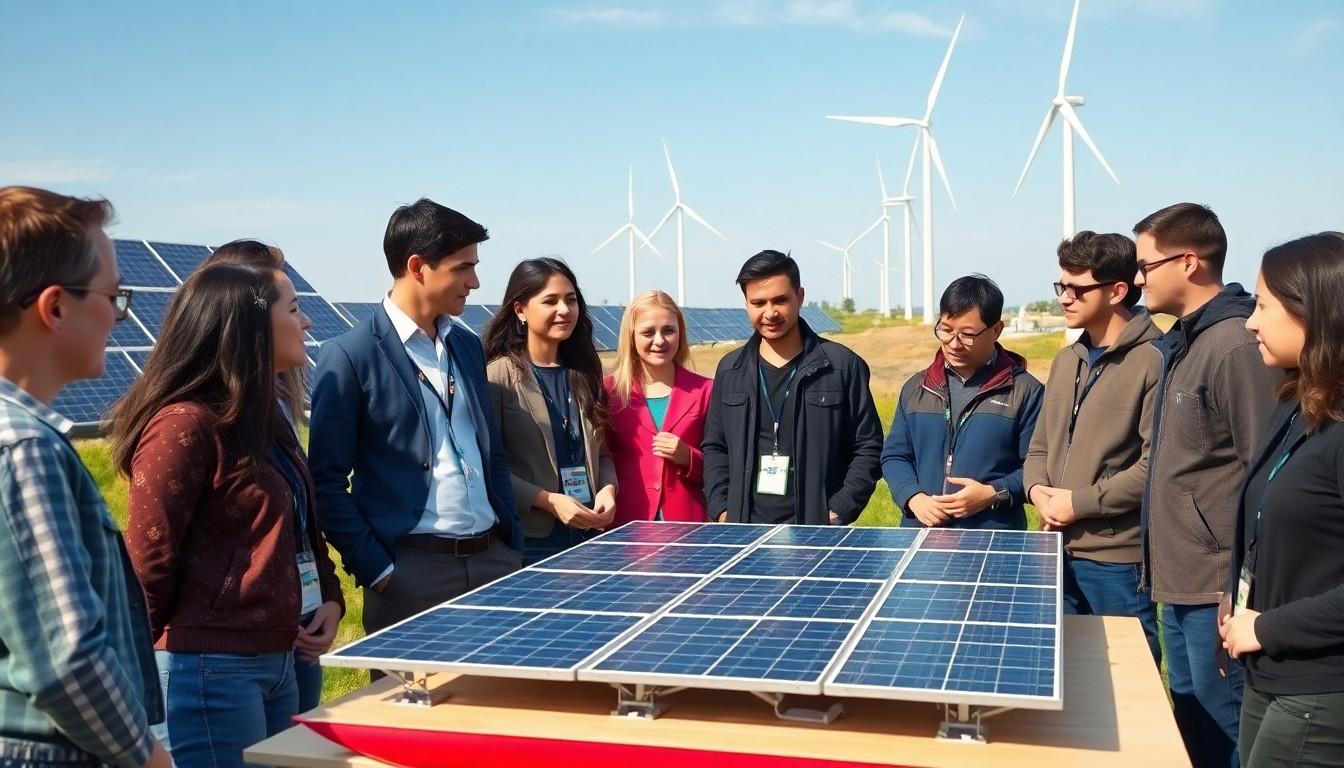In a world where the climate crisis feels like a never-ending episode of a bad reality show, climate tech startups are the unlikely heroes we never knew we needed. These innovative companies are stepping up to tackle environmental challenges with creativity and a dash of audacity. Think of them as the Avengers of sustainability, armed with cutting-edge technology and a mission to save the planet—one brilliant idea at a time.
From carbon capture to renewable energy, these startups are not just dreaming of a greener future; they’re building it. With a sprinkle of humor and a serious dose of determination, they’re proving that saving the Earth can be both impactful and entertaining. Dive into the world of climate tech startups and discover how they’re turning the tide against climate change while keeping the planet lively and thriving.
Climate Tech Startups
Climate tech startups focus on creating innovative solutions for environmental challenges. These companies address pressing issues like climate change and resource depletion. Many work on projects involving carbon capture technologies, renewable energy production, and sustainable agriculture practices.
Startups in this sector vary widely in focus and approach. For instance, some prioritize electric vehicles while others develop waste management solutions. The common goal remains reducing carbon footprints and improving sustainability across industries.
Investment in climate tech startups has surged recently. According to PitchBook, global investment in climate tech reached $40 billion in 2021, showcasing significant interest from venture capitalists. Many investors recognize the potential for both financial returns and environmental impact.
Government policies also play a crucial role in shaping this landscape. Regulations aimed at reducing greenhouse gas emissions incentivize startups to innovate. Tax credits and grants facilitate research and development in clean technologies.
Collaboration is essential among climate tech startups, established companies, and research institutions. Partnerships often result in the sharing of knowledge and resources, accelerating the implementation of solutions. By working together, entities can enhance efforts to combat climate change more effectively.
As a sector, climate tech startups inspire hope and demonstrate that technology can drive positive change. Their persistent creativity leads to new strategies for improving the planet’s health. Innovative solutions from these companies pave the way toward a sustainable future.
Key Areas of Innovation

Climate tech startups are revolutionizing various sectors through innovative solutions. Each area of focus contributes to combatting climate change and enhancing sustainability.
Renewable Energy Solutions
Renewable energy solutions lead the charge in sustainable practices. Companies are developing solar panels, wind turbines, and energy storage systems to harness clean energy sources. In 2021, funding for renewable energy startups reached over $20 billion, showcasing investor confidence in this sector. Technologies like floating solar farms and offshore wind farms exemplify cutting-edge developments. Enhanced efficiency in energy generation results in lower costs for consumers and reduced reliance on fossil fuels.
Carbon Capture Technologies
Carbon capture technologies play a crucial role in mitigating greenhouse gas emissions. Startups are designing innovative methods for capturing and storing carbon dioxide from industrial processes. Various approaches include direct air capture and carbon mineralization, which transform CO2 into solid materials. In 2021, investments in carbon capture exceeded $6 billion, reflecting significant global interest. Effective implementation of these technologies significantly reduces atmospheric CO2 levels, supporting climate goals and sustaining the environment.
Sustainable Agriculture Practices
Sustainable agriculture practices are essential for reducing environmental impact in food production. Startups employ techniques such as precision farming and vertical farming to optimize resource use. Technologies like soil sensors and hydroponics improve crop yields while minimizing water and fertilizer usage. In 2021, funding for sustainable agriculture surpassed $5 billion, indicating growing awareness of food sustainability. Emphasizing local supply chains and reducing food waste enhances resilience and fosters healthier ecosystems.
Challenges Facing Climate Tech Startups
Climate tech startups encounter various challenges that can hinder their progress in addressing climate change. These include funding issues, regulatory hurdles, and market competition.
Funding and Investment Issues
Funding remains a critical hurdle for climate tech startups. Despite the $40 billion in global funding achieved in 2021, many startups struggle to attract investment. Investors often prioritize established industries over newer technologies. A lack of understanding about the potential market for innovative climate solutions fosters this hesitation. Additionally, early-stage startups find it difficult to secure grants, making reliance on venture capital essential. Funders may worry about the long-term viability of these startups, leading to limited financial support. Addressing these funding gaps remains vital for scaling effective solutions.
Regulatory Hurdles
Regulatory challenges significantly impact the operational landscape for climate tech startups. Compliance with existing environmental laws can impose additional operational costs. Uncertainty in government policies creates an unstable environment for new ventures. Startups often navigate complex regulatory frameworks across different jurisdictions. Delays in securing permits or approvals can slow down project timelines. Regulatory inconsistencies can also discourage potential investors who seek stability. Overcoming these hurdles is crucial for fostering innovation and ensuring sustained progress in the climate tech sector.
Case Studies of Successful Startups
Climate tech startups demonstrate remarkable innovation and resilience. Their efforts significantly impact various industries and contribute to environmental sustainability.
Notable Companies and Their Impact
Several notable companies lead the charge in climate tech. Tesla, a pioneer in electric vehicles, has not only revolutionized transportation but also spurred massive investments in battery technology. Beyond transportation, companies like Pivot Bio focus on sustainable agriculture, creating microbes that replace synthetic fertilizers, reducing agricultural emissions. Another example, Climeworks, specializes in direct air capture, successfully capturing CO2 from the atmosphere. Their innovative approaches attract investment and showcase the possibilities within the climate tech sector.
Lessons Learned from Failures
Examining failures reveals important lessons. Companies such as Biofool faced challenges in scaling technology while grappling with market acceptance. Misalignment between product offerings and consumer readiness can lead to setbacks. Additionally, regulatory complexities hindered firms like GreenSky, which struggled to navigate compliance while aiming for rapid growth. Recognizing and addressing these challenges can guide new startups toward sustainable success in the climate tech landscape.
Future Trends in Climate Tech
Emerging trends indicate a shift towards greater reliance on artificial intelligence and machine learning in climate tech startups. Innovative algorithms are being developed to optimize energy management and reduce waste in real-time. Advanced analytics improve resource allocation, enhancing overall efficiency.
Biotechnology is also gaining traction. Companies are creating sustainable materials through biodegradable products that reduce plastic usage. Startups are harnessing the power of genetic engineering to develop crops that require less water and fertilizer while yielding higher outputs.
Growth in urban agriculture is notable, driven by innovations in vertical farming. These methods allow food production within cities, reducing transportation emissions significantly. As populations rise, sustainable farming techniques are vital in meeting future food demands while minimizing environmental impact.
Electric vehicles continue to dominate discussions in climate tech. Increased adoption is evident, supported by advancements in battery technology that extend range and reduce costs. The push for charging infrastructure expansion complements this trend, aiming to eliminate barriers for potential users.
Carbon capture and storage technologies are also essential. As investments in this area exceed $6 billion, startups are focused on developing methods to capture emissions from various industries. Innovative solutions enhance efficiency in existing systems while reducing overall carbon footprints.
Investment interest remains high, soaring to over $40 billion in 2021 alone. Venture capitalists see substantial potential for financial returns alongside environmental benefits. This trend is expected to persist as more startups emerge, tackling diverse challenges within the climate tech sector.
Regulatory support continues to encourage innovation. Incentives such as tax credits drive research and development in clean technologies. Collaboration among startups, established firms, and research institutions fosters partnerships that facilitate knowledge sharing.
Attention to public opinion and consumer preferences profoundly influences climate tech startups. Sustainability-focused consumers increasingly demand environmentally friendly products and services. This evolving landscape urges startups to innovate effectively to meet market expectations.
Battle Against Climate Change
Climate tech startups are at the forefront of innovation in the battle against climate change. These companies are not just addressing environmental challenges but are also paving the way for a sustainable future. With increased investment and supportive government policies, they’re poised to make significant strides in various sectors.
The collaboration between startups and established entities enhances knowledge sharing and accelerates the development of impactful solutions. Despite facing hurdles like funding and regulatory challenges, the resilience and creativity of these startups shine through. As they continue to innovate and adapt, there’s a growing sense of optimism that technology can indeed drive the change needed for a healthier planet. The journey ahead is promising, and the potential for positive impact is immense.

